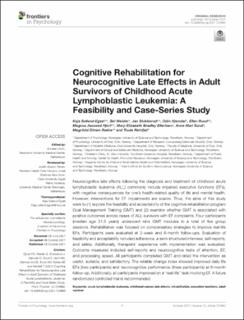| dc.description.abstract | Neurocognitive late effects following the diagnosis and treatment of childhood acute lymphoblastic leukemia (ALL) commonly include impaired executive functions (EFs), with negative consequences for one’s health-related quality of life and mental health. However, interventions for EF impairments are scarce. Thus, the aims of this study were to (1) explore the feasibility and acceptability of the cognitive rehabilitation program Goal Management Training (GMT) and (2) examine whether GMT is associated with positive outcomes across cases of ALL survivors with EF complaints. Four participants (median age 31.5 years) underwent nine GMT modules in a total of five group sessions. Rehabilitation was focused on compensatory strategies to improve real-life EFs. Participants were evaluated at 2-week and 6-month follow-ups. Evaluation of feasibility and acceptability included adherence, a semi structured interview, self-reports, and safety. Additionally, therapists’ experience with implementation was evaluated. Outcome measures included self-reports and neurocognitive tests of attention, EF, and processing speed. All participants completed GMT and rated the intervention as useful, suitable, and satisfactory. The reliable change index showed improved daily life EFs (two participants) and neurocognitive performance (three participants) at 6-month follow-up. Additionally, all participants improved on a “real-life” task involving EF. A future randomized controlled trial is recommended. | en_US |

